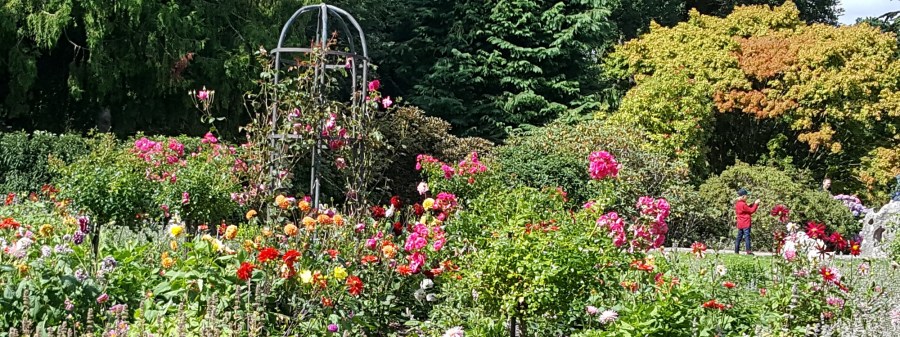This book was a first for me for two reasons: my first Elizabeth von Arnim and my first Virago Modern Classic. Both widely recommended by other book bloggers, so as usually I am late to the party. But i is because of those recommendations that I grabbed this book in a second hand bookshop as soon as I saw it, so thank you all dear book bloggers!
I started reading it on a June Saturday evening when the sun has already set and initially I couldn’t get in the mood, something didn’t feel right. Luckily the Sunday was a beautiful day and I could go to the Rose Garden in Greenwich Park, lie down on a blanket, flowers around me, blue sky above, birds and quiet sound of people talking somewhere around but not too close. I must tell you, this is how this book should be read, because I devoured it in two hours, appreciating the book more because of the nature around me and appreciating the nature because of the book. Perfect combination, so if you have a park nearby or are lucky enough to have a garden please make sure you read this book outside.
Elizabeth von Arnim, known before as Mary Annette Beauchamp, married Count Henning August von Arnim-Schlagenthin and lived with him for few years in Berlin, where she wasn’t happy at all. Then she discovered her husband owned an estate in Pomerania, when she visited she fell in love with the place and convinced her husband to move there. This is where she created her German garden, her paradise on earth, with the dreadful social calls reduced to minimum and allowed to spend time in any way she liked. In her book von Arnim describes in a witty and sometimes ironic way her struggle to create he garden, as a person that didn’t know the first thing about gardening, but she also describes her deep love for the place, for nature and how she cherishes the time she has for herself. The main trope of the book is definitely the love of nature and the soothing effect it has on people. Von Arnim is aware how lucky she is to be able to move out of the city like this and spend time in the way she likes, to have people around her who put up with, as they believe, her eccentricities. I must admit the descriptions of the garden were a bit lost on me, because I simply don’t know the names of most of the flowers in English (I’m not sure I’d known them in Polish), at the beginning I tried to google them to be able to imagine the garden better, but I found that this distracts me from the flow of the book.
Another aspect of von Arnim’s book is her sharp social observations, when she describes people in the city obsessed with status and owning things, marrying well etc. She describes people who come to visit her (they usually annoy her, stealing her ‘me-time’) and the description of the visit for Christmas of her friend Irais and a friend of a friend Minora is a really hilarious one, one can almost feel Elizabeth’s annoyance with her guests and it being winter she can escape to her garden a lot less.
Her thoughts on women equality ring very modern, I was surprised about it, they must have sounded revolutionary in 1898 when the book was published. I liked how she used The Man of Wrath (as she calls her husband throughout the book) as a counterpoint to make her statement on the need of equality even more pronounced. She definitely was a liberated woman and one not afraid to defend her right to do as she thinks right. This is not to say that she never compromised with The Man of Wrath, but I do believe compromise is needed in every relationship, one cannot be at war all the time.
Elizabeth also has three kids, she calls them April, May and June child, from the months they were borne. Her descriptions of children behaviour were really entertaining. She managed to capture the innocence but also first signs of manipulation. In line with her thoughts on the role of women in society, her approach to motherhood was also quite progressive and relaxed. She loves her children but is not obsessed by them, is not reduced solely to being a mother to them and a wife to her husband, she remains her own person and the garden certainly helps her with that.
It is a lovely book, pure escapism, it reads easily, is serious, ironic, amusing and funny in equal parts. But most of all it emanates with the joy of life, with being happy about simple things. I needed such life affirmative book in our grim times.
Quotes from Elizabeth and Her German Garden
This is book #2 of my 20 Books of Summer hosted by Cathy at 746books.
See my list as it grows here.
Photo by Violetta Kaszubowska @ vkphotospace


I’m so glad I read this review. Elizabeth sounds just like me! I’ll have to keep an eye out for this…
LikeLiked by 1 person
It is a lovely book. I’m sure I’ll be coming back to Elizabeth’s garden. And it is so nice to find a soulmate in a book 🙂
LikeLiked by 1 person
I’ve not yet read Von Arnim but I recently found a used copy of The Enchanted April and I am looking forward to it. This one sounds delightful.
LikeLiked by 1 person
It is lovely, as soon as I’m done with my book buying ban (or I give up on it) I’m going on a hunt for other books by von Arnim. This one is definitely a pleasure to read, especially if you can read it outside 🙂 looking forward to your thoughts on it.
LikeLiked by 1 person
This sounds wonderful. I really like von Arnim but I’ve not read this. Greenwich Park is gorgeous – good choice!
LikeLiked by 1 person
Thanks! Yes, Greenwich and von Arnim definitely worked well together 🙂 it was a glorious day reading, one of those when everything falls perfectly into place.
LikeLiked by 1 person
I adore this book, I think it’s the first of hers I read and I’ve read many since. If you like the wry humour in it you’ll love others of hers.
LikeLiked by 1 person
I definitely want to try her other books, I loved her distance and not taking anything too seriously. As soon as my book buying ban is over I’m going for a hunt! Which one would you recommend for a second read?
LikeLiked by 1 person
Any that you can find!!
LikeLiked by 1 person
Hahaha! Will do 🙂
LikeLike
Pingback: #20booksofsummer completed – bookskeptic.com
Pingback: The Enchanted April – Elizabeth von Arnim – bookskeptic.com
Pingback: Top 17 of 2017 – bookskeptic.com
Pingback: Naturaleza doméstica – Pareidolia
Pingback: Books for the Lockdown – Happy and Funny – bookskeptic.com
Pingback: Elizabeth and Her German Garden – Elizabeth von Arnim – Quotes – bookskeptic.com
Pingback: The Dud Avocado – Elaine Dundy – bookskeptic.com